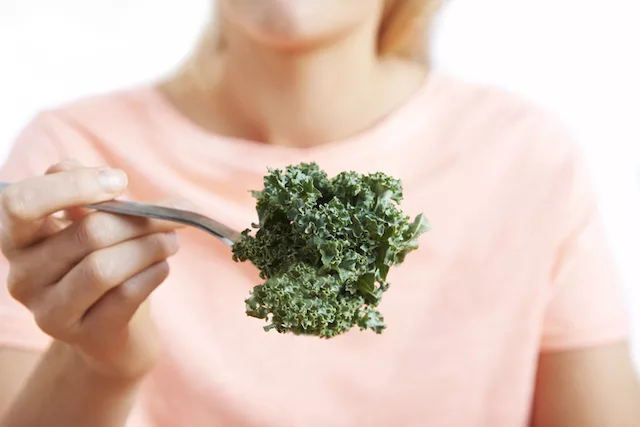Eating a varied diet full of fresh, whole foods is one of the best things you can do for your health and well-being. But even if you do that perfectly, you may still experience bloating and constipation, as well as other forms of digestive distress. What’s going on? While many foods and drinks may be healthy in themselves, that doesn’t mean they’re right for everyone, which is why a personalized approach to nutrition is key.
Ahead, we’ve rounded up the top 10 healthy foods that cause bloating—some of which might surprise you. Plus, RD-approved tips for reducing their impact and alternatives worth considering.
10 Healthy Foods That May Cause Bloating and Constipation:

1. Soda
Are you the type of person who always has a lot of sparkling water on hand? If so, know that sparkling water is a great way to hydrate, theoretically helping you avoid constipation and the bloating that comes with it. However, sparkling water can also cause bloating after drinking it. “If you’re concerned about bloating, switch to still water and watch it subside,” says Brigitte Zeitlin, MPH, R.D., Dietitian of Canada, founder of BZ Nutrition.
2. Prebiotic Soda
Prebiotic sodas are on the rise right now—the market is worth a whopping $262.2 million, according to research from Future Market Insights. Not only are they a tasty alternative to sugary sodas and juices, but they’re also more nutritious thanks to their prebiotic fiber content.
“Gut-friendly sparkling waters with ingredients like inulin and chicory root have become popular health drinks due to their prebiotic properties,” says Erin Kenney, MS, RDN, LDN, HCP, a dietitian specializing in digestive health. “Prebiotics are substances that promote the growth of good bacteria in the gut, which can improve overall digestive health. However, these ingredients can also cause bloating and gas in some people, especially if they have an overgrowth of certain types of bacteria in their gut.”
That being said, if you’re prone to bloating, constipation, and gas, or have other signs of poor gut health, you’re better off giving these popular beverages a miss. (The same goes for other sparkling beverages that seem healthy enough, Zeitlin notes, including but not limited to kombucha.) Still craving a sip of flavor? “Non-carbonated fresh fruit drinks are a better choice,” Kenney shares.
3. Chia seeds
I’m a huge fan of chia seeds. Not only are they high in plant-based protein and fiber (two tablespoons contains 4.68 grams and 9.75 grams, respectively), but they’re also versatile and can be added to salads, smoothies, puddings, and more. However, they’re one of the health foods most likely to trigger bloating in sensitive people, says Kenny. “Chia seeds absorb a lot of water, which can expand in the digestive tract and may cause bloating,” she explains. Before cutting chia seeds out of your diet completely, she recommends drinking plenty of water every time you eat them, which can help *the body* keep going and potentially mitigate this side effect.
PS: It is recommended to increase your H2O intake when eating or drinking any fiber food, especially when adding more high-fiber foods to your diet.
4. Quinoa
Kenney acknowledges quinoa’s status and value as a superfood. One cup of quinoa contains 8 grams of plant protein, 5.2 grams of fiber, and a handful of vitamins and minerals, including iron, magnesium, and vitamin B6. Despite these benefits, quinoa may not be suitable for people with digestive issues, in large part due to its high fiber content. “It also contains saponins, which may irritate the digestive tract of some people,” Kenney explains. If you find that your stomach is upset after consuming quinoa, she recommends reducing your serving size or swapping it out for another carbohydrate source, such as rice.
hint: When adjusting your diet to combat bloating, consider supplementing with digestive enzymes, such as Flatter Me by HUM. These vegetarian capsules contain 18 full-spectrum digestive enzymes to help break down foods like carbohydrates, fats, proteins, fiber, sugars, and lactose. (People who need more effective bloating relief may prefer Flatter Me Extra Strength, which contains 50% more of these enzymes for very potent and fast-acting anti-bloating support.)
5. Beans and Legumes
Similar to quinoa, beans and legumes (including lentils, chickpeas, and peanuts) are favored for being high in plant-based protein and fiber. However, Zeitlin warns that if you eat more than your stomach can handle, you’re overdoing it. She recommends eating no more than a quarter cup of beans at a time and paying attention to your digestion. “If you still feel bloated or gassy, then replace the beans with tofu,” she says. [another] “Plant protein options,” she advises.
6. Cruciferous vegetables
The last type of fiber foods on this list that may cause bloating are cruciferous vegetables, which include but are not limited to:
- Chinese cabbage
- broccoli
- Brussels sprouts
- cabbage
- cauliflower
- Kale
“These foods are a hidden cause of bloating because they are often touted as some of the healthiest foods of the day,” Zeitlin says. “That’s still true: Their high fiber content makes them good for you, but they can also cause bloating.” [triggers] bloating.” If you have a sensitive stomach, she recommends cooking these vegetables rather than eating them raw, as this reduces the fiber content and makes them easier to digest.
7. Onions and garlic
While these alliums add flavor and depth to many dishes, they can also give you unexpected consequences in the form of an upset stomach. “Onions and garlic contain fructans, which can cause digestive discomfort and bloating,” explains Kenny. This is especially true for people with irritable bowel syndrome or small intestinal bacterial overgrowth (SIBO). Since they’re ubiquitous in countless meals across cultures, it can be challenging to eliminate them completely. Likewise, with cruciferous vegetables, cooking them may help alleviate digestive discomfort. Kenny also suggests replacing them with alternatives like shallot or garlic infused oils, which provide flavor without the fructans.
8. Peach
These juicy fruits are delicious yet a surprisingly healthy food that may leave you bloated after eating them. “They are high in fructose and sugar alcohols, such as sorbitol, which can cause bloating and digestive discomfort in some people,” says Kenny. If you’re not ready to give them up when they’re in season, she recommends eating them in moderation.
9. Dairy products
It may not be surprising that this food group can trigger bloating, especially if you are lactose intolerant or lactose sensitive. However, it is worth reiterating that dairy products are a common cause of digestive distress. “Be careful about the total amount of cheese, cottage cheese, yogurt, or milk you eat. [you consume]” The small amount of creamer or milk you add to your coffee might even be enough to cause bloating, at which point you might want to opt for an alternative milk or drink your coffee black.
10. Artificial Sweeteners
Artificial sweeteners are like wolves in sheep’s clothing. You might think that artificial sweeteners are a good thing for you compared to refined sugar, but they come with their own potential problems. According to a 2022 clinical trial published in the journal Science Natural Medicinenonnutritive sweeteners disrupted the gut microbiome in healthy participants while also impeding glucose tolerance. “These fake sugars—often containing sugar alcohols, which give them a sweet taste but contain no calories—can disrupt your gut bacteria and lead to bloating, gas, and stomach upset,” Zeitlin warns. She recommends keeping an eye on where they might be lurking (e.g., in your coffee, office snacks, and other sugar-free treats) and avoiding them. Alternatively, opting for “no-bloat” snacks will help keep your gut healthier and happier *and* prevent bloating.
Key points about bloating and constipation
In addition to all of the above suggestions, remember that everyone is different and if in any doubt, consult your doctor for any serious concerns.


 Anal Beads
Anal Beads Anal Vibrators
Anal Vibrators Butt Plugs
Butt Plugs Prostate Massagers
Prostate Massagers
 Alien Dildos
Alien Dildos Realistic Dildos
Realistic Dildos
 Kegel Exercisers & Balls
Kegel Exercisers & Balls Classic Vibrating Eggs
Classic Vibrating Eggs Remote Vibrating Eggs
Remote Vibrating Eggs Vibrating Bullets
Vibrating Bullets
 Bullet Vibrators
Bullet Vibrators Classic Vibrators
Classic Vibrators Clitoral Vibrators
Clitoral Vibrators G-Spot Vibrators
G-Spot Vibrators Massage Wand Vibrators
Massage Wand Vibrators Rabbit Vibrators
Rabbit Vibrators Remote Vibrators
Remote Vibrators
 Pocket Stroker & Pussy Masturbators
Pocket Stroker & Pussy Masturbators Vibrating Masturbators
Vibrating Masturbators
 Cock Rings
Cock Rings Penis Pumps
Penis Pumps
 Wearable Vibrators
Wearable Vibrators Blindfolds, Masks & Gags
Blindfolds, Masks & Gags Bondage Kits
Bondage Kits Bondage Wear & Fetish Clothing
Bondage Wear & Fetish Clothing Restraints & Handcuffs
Restraints & Handcuffs Sex Swings
Sex Swings Ticklers, Paddles & Whips
Ticklers, Paddles & Whips




















